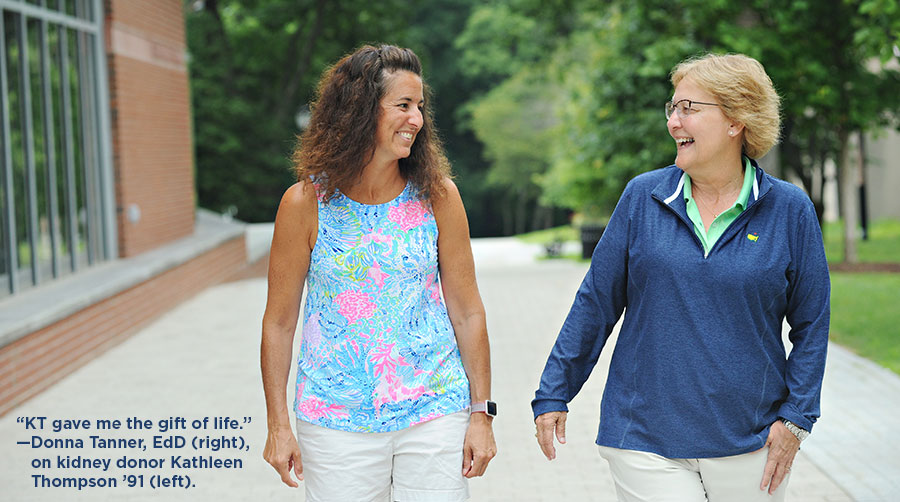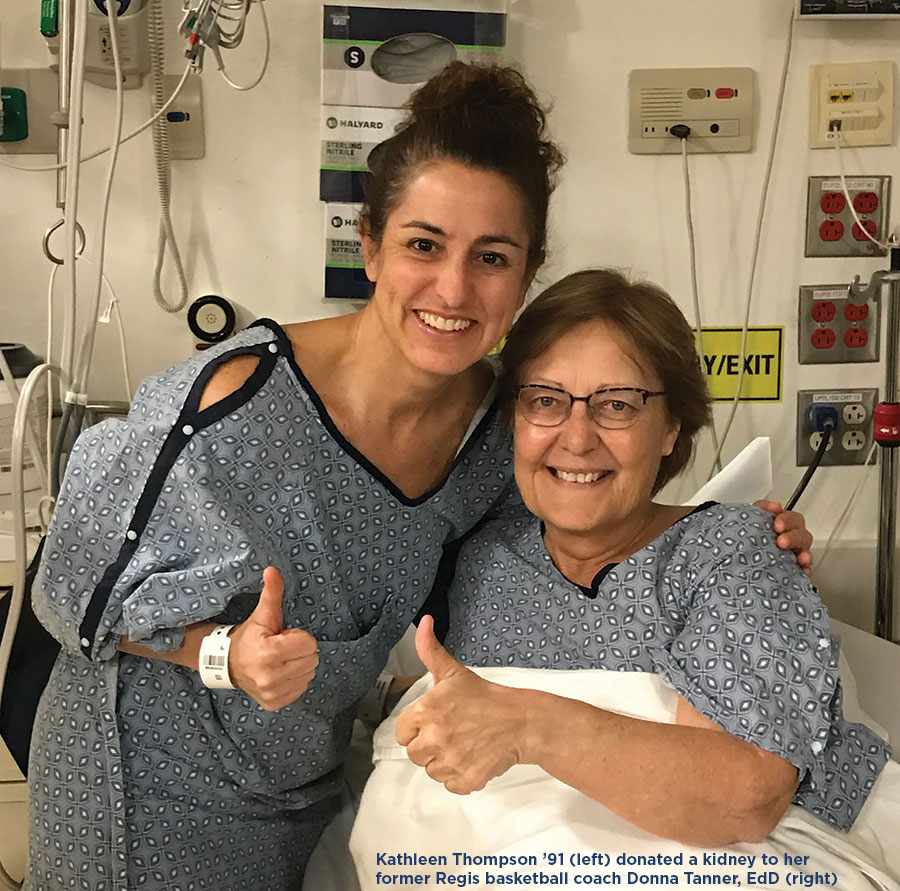Kathleen Thompson ’91 never intended to play sports in college. She had been a three-season athlete at Hudson Catholic High School but thought juggling academics with college-level sports might be too difficult. “I graduated with a class of 54 students,” says Thompson of her hometown high school. “Regis seemed huge to me!”
To ease the transition, Regis paired first-year students with “big sisters”—juniors who showed them around campus and served as mentors. Thompson’s was Sara Dwyer ’89, a member of Regis’ basketball team. “Sara knew I played in high school and encouraged me to try out,” recalls Thompson, who threw herself into campus life—joining Tower Society (student tour guides now referred to as Pride Guides) and the Yearbook Committee, serving as treasurer of her class, and running cross country. But it was the basketball team—where Thompson was a guard and a captain—that she found most fulfilling.
During her junior year, a new head basketball coach was hired. Donna Tanner, EdD, an elementary school teacher, coached soccer and basketball at Weston High School before making the switch to Regis’ Division III women’s basketball team. “What Donna did for the program was incredible,” says Thompson. “Regis became much more competitive thanks to her coaching style and recruiting skills.”
Thompson’s senior season saw the basketball program make its first appearance in the Commonwealth Coast Conference (CCC) Championship. The then-Regis Beacons would win in 1991 and return to the CCC finals three other times (1993–94, 1994–95, 1995–96). Tanner was named Coach of the Year in 1994 and 1996 and Northeast Division III Coach of the Year in 1996. She credits her players with the team’s success. Of Thompson she says: “KT was quick and loved to run. She was a great role model for her teammates.”
Regis’ athletic program—and Tanner’s mentorship—impacted Thompson’s personal growth. Her senior year, Thompson received the Mother Regis Award (now known as the Regis-Casserly Award), the most prestigious award given by Regis athletics. “I came to Regis as a shy kid and left a different person,” she says. “I gained confidence and lifelong friendships. I wouldn’t be where I am today without my background in Regis athletics.”

Making a Difference in Kids’ Lives
Off the court, Thompson majored in mathematics and minored in business. With the encouragement of Tanner and professor Judith Costello, CSJ, ’66, she set her sights on a career as a high school math teacher. “I tutored inner-city kids on weekends and helped Donna run basketball clinics. Those experiences with children made me realize I’d never be happy in the business world and was better suited for the classroom,” says Thompson, noting the connection she still shares with students. “I’m good at getting to know kids’ strengths and helping kids who think they aren’t ‘good at math’ get good at it.”
While pursuing a master’s degree in secondary mathematics education at Boston University, Thompson worked as the assistant coach of Weston High’s basketball team alongside former Regis professor and softball coach Joanne Ruane. She stayed in touch with Tanner and Regis’ basketball program, attending fundraisers and playing in alumni games. “Donna was great at keeping alumni involved,” she says.
Thompson and Tanner’s coach-player relationship grew into a friendship as they advanced professionally. Currently a mathematics teacher at Lincoln-Sudbury Regional High School, Thompson taught mathematics and coached girls’ cross country and basketball at Wayland High School for 20 years. Tanner, who obtained a doctoral degree in educational leadership after leaving Regis, worked as an elementary school principal before retiring in 2014. Today, she is coordinator of elementary and secondary education at Northern Essex Community College and teaches at American International College.
“KT and I talk often about the challenges and rewards of teaching and coaching,” says Tanner. “We love making a difference in kids’ lives.” The friends also share a passion for the game of golf. They play across the United States and at courses in Scotland and Ireland. In spring 2017, they won a tournament at North Conway Country Club—a victory that would prove bittersweet.
A Life-threatening Kidney Disease
My perspective was: ‘I have a friend and she needs help.’ It was people’s reactions that surprised me. Many were shocked to hear I was donating a kidney, whereas I thought, ‘Well, why wouldn’t I?’
Kathleen Thompson ’91
Polycystic Kidney Disease (PKD), a disorder that causes cysts to grow on the kidneys and can lead to kidney failure, runs in Tanner’s family. Her father died of the disease and her brother had three PKD-related kidney transplants—one from a live donor (their mother) and two from deceased donors. Soon after the North Conway golf tournament, Tanner visited the nephrologist who had been monitoring her kidney function. “I was tired a lot,” she recalls. Blood work indicated alarmingly high creatinine levels that signified end-stage kidney failure—a life-threatening problem that required treatment as soon as possible.
Tanner transferred her care to Brigham and Women’s Hospital in Boston, where the world’s first kidney transplant was performed in 1954. “I was in complete shock,” she says when she learned that a lifetime of dialysis or a kidney transplant were her only options. “My doctors told me a transplant would be most successful if I could find a living donor.” Patients without a living donor are placed on a list managed by the United Network for Organ Sharing (UNOS) to wait for a deceased donor kidney. The average waiting time can be three to five years. Living-donor transplantation decreases wait time and is associated with fewer complications than deceased-donor organ transplants. There is also a longer survival of the donor organ.
Reticent by nature, Tanner says she was taken aback when her medical team encouraged her to publicize her plight. “I’m not one to share my private life,” she says. “But I didn’t want to be strapped to a dialysis machine three times a week given how active I am.” She sent friends an email detailing her medical situation and posted on Facebook. “I knew it was a lot to ask. The process of becoming a kidney donor is complex.”
But Thompson was up for the challenge. “I didn’t really think about it,” she says. “My perspective was: ‘I have a friend and she needs help.’ It was people’s reactions that surprised me. Many were shocked to hear I was donating a kidney, whereas I thought, ‘Well, why wouldn’t I?’”
That kind of response wasn’t a surprise to Tanner. “When KT heard the news about my challenges, she never hesitated. And if you know KT, that is just who she is. She is one of the most giving, courageous, and generous individuals I know.”
Kidney Buddies for Life
A blood typing test at Thompson’s summer 2018 physical revealed she had type O blood, making her a universal donor compatible with any blood type. “I called Donna right away,” she says. Thompson then contacted the living donor coordinator at Brigham and Women’s Hospital. “I received tons of education and had months of testing including blood work, scans, and a psychological evaluation,” she says. (The required workup and transplant procedure are done at no cost to donors.)
Just after Christmas 2018, Thompson got the results of the extensive evaluation. “I was a match!” she says. Her healthy lifestyle—Thompson doesn’t smoke or drink and is physically fit—boded well for Tanner. “Only 20 percent of all kidney transplants performed in the United States are living-donor transplants,” says Tanner. “How fortunate was I that my donor was healthy, younger than me, and also a close friend!”
Plans accelerated and surgery was scheduled for January 31, 2019—just nine months after Tanner was initially diagnosed. (In many cases like Tanner’s, it can take several years to find a live kidney donor.) In two separate operations, Thompson’s healthy kidney was removed laparoscopically and transplanted into Tanner. Stefan G. Tullius, MD, chief of Transplant Surgery, led the surgical teams. “Kathleen’s kidney immediately kicked in and I felt better right away,” says Tanner, who spent five days in the hospital. Thompson was hospitalized for three days and visited Tanner at her bedside as did Regis friends.
The duo recovered at their homes and Thompson returned to normal activities quickly. “I felt great,” she says. Tanner’s health also improved significantly, although she must take daily immunosuppressant (anti-rejection) drugs for the rest of her life to avoid infection. “KT gave me the gift of life, so if all I have to do is be careful and take some medication, I can do that,” she says, noting that the friends have booked a golf excursion to England to celebrate her recovery.
“This experience has been an eye opener for me,” says Tanner, referring to each day as a blessing. “It’s one thing to consider donating an organ when you hear that someone is in need, but to follow through and save someone’s life demonstrates the power of selflessness, giving, and sacrifice—attributes KT undoubtedly learned from her family, life experiences, and the Regis community. Without a kidney, my life expectancy on dialysis was not long.”
Grateful for her second chance, Tanner offers this sage advice: “Appreciate the people around you and take time to listen. And when you’re as lucky as me to have a beautiful friend like KT, work extra hard to live up to her example.”

Become an Organ Donor
According to United Network for Organ Sharing (UNOS), over 113,000 people in the U.S. are waiting for an organ transplant—5,000 of them in New England. Every 10 minutes another name is added to the national organ transplant waiting list, most waiting for a kidney or a liver—two organs that can be donated by a living person.
In 2018, there was a total of 36,527 organ transplants done in the U.S.—29,680 involved organs from deceased donors and 6,849 were living donor transplants.
Get the Facts
- Organs donated after death are the heart, liver, kidneys, lungs, pancreas, and intestines.
- One deceased donor can save up to eight lives.
- A healthy person can become a “living donor” by donating a kidney, or part of the liver, lung, pancreas, or intestines.
- People of all ages and medical histories can be donors.
- Many factors determine waiting list priority, but not wealth or fame.
- Medical care won’t be compromised because you’re a donor.
- There is no cost to be an organ donor.
- While 95% of Americans are in favor of being a donor, only 56% are registered.
To learn about organ donation, visit UNOS or New England Donor Services.
To register as a donor, visit your Registry of Motor Vehicles (RMV) or register online.
Read more articles
Read the entire magazine online